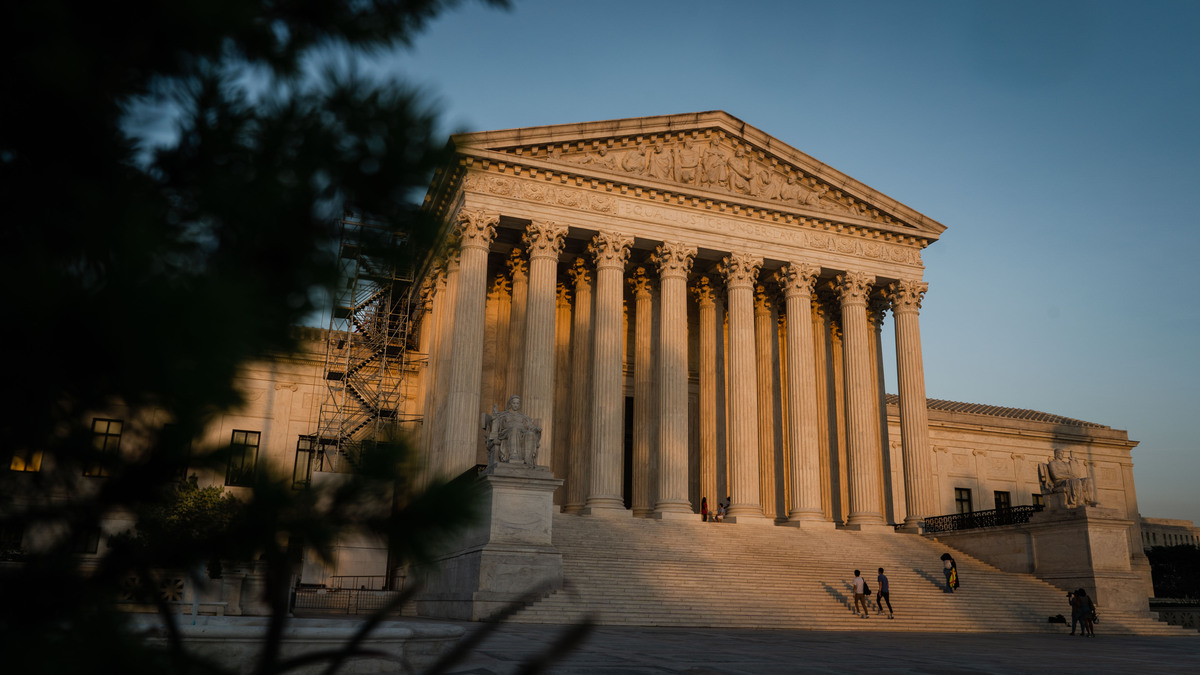The Supreme Court of the United States on Friday, April 21, 2023 in Washington, D.C.
Kent Nishimura/Los Angeles Times via Getty Images
hide caption
toggle caption
Kent Nishimura/Los Angeles Times via Getty Images


The Supreme Court of the United States on Friday, April 21, 2023 in Washington, D.C.
Kent Nishimura/Los Angeles Times via Getty Images
The U.S. Supreme Court unanimously sided with Twitter in a case brought by plaintiffs who said the social media company aided and abetted terrorism. Based on its opinion, it sent a related case involving Google back to the lower courts.
At issue in the cases were the November 2015 terrorist attacks in Paris, carried out by ISIS, that killed 130 people and injured 400. Lawyers for the family of a 23-year-old American killed in the attack challenged Section 230 of the 1996 Communications Decency Act, which protects social media companies. Essentially, the law treats web platforms the same way that it treats the telephone. And just like phone companies, websites that are host to speakers cannot be sued for what the speakers say or do.
“To be sure, it might be that bad actors like ISIS are able to use platforms like defendants’ for illegal — and sometimes terrible — ends,” Justice Clarence Thomas wrote for the unanimous court. “But the same could be said of cell phones, email, or the internet generally.
“Yet, we generally do not think that internet or cell service providers incur culpability merely for providing their services to the public writ large. Nor do we think that such providers would normally be described as aiding and abetting, for example, illegal drug deals brokered over cell phones — even if the provider’s conference-call or video-call features made the sale easier.”
The family of the victim and others who lost family to terrorism sued Google, Twitter, Facebook and other social media companies under the federal Anti-Terrorism Act, which specifically allows civil damage claims for aiding and abetting terrorism. The families allege that the companies did more than simply provide platforms for communication. Rather, they contend, that by recommending ISIS videos to those who might be interested, they were seeking to get more viewers and increase their ad revenue.
The court said Thursday that the plaintiffs failed to state a claim.
“The fact that these algorithms matched some ISIS content with some users thus does not convert defendants’ passive assistance into active abetting. Once the platform and sorting-tool algorithms were up and running, defendants at most allegedly stood back and watched; they are not alleged to have taken any further action with respect to ISIS,” Thomas wrote. “At bottom, then, the claim here rests less on affirmative misconduct and more on an alleged failure to stop ISIS from using these platforms. … To show that defendants’ failure to stop ISIS from using these platforms is somehow culpable with respect to the Reina attack, a strong showing of assistance and scienter would thus be required. Plaintiffs have not made that showing.”
Had the court founds against the companies, it likely would have meant that they would constantly be defending their conduct in court.
This story originally appeared on NPR


